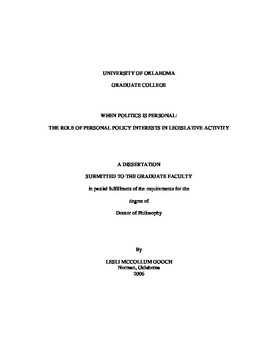| dc.contributor.advisor | Copeland, Gary, | en_US |
| dc.contributor.author | Gooch, Lesli Mccollum. | en_US |
| dc.date.accessioned | 2013-08-16T12:20:04Z | |
| dc.date.available | 2013-08-16T12:20:04Z | |
| dc.date.issued | 2006 | en_US |
| dc.identifier.uri | https://hdl.handle.net/11244/992 | |
| dc.description.abstract | Mainstream literature on congressional behavior continues to concentrate on reelection as members' primary motivator, rather than exploring the other reasons for the legislative activities in which members engage. Although the district is an important, ever-present consideration for members as they decide how to allocate their legislative resources, service in Congress offers a range of opportunities for them to get involved with policies that are not directly related to their districts. Members can gravitate toward issues that they care about for reasons that are separate and distinct from the needs of their constituents. When Politics is Personal seeks to capture this little-researched, but important aspect of legislative behavior, to understand how personal interests impact legislators' policymaking activities. Through interviews with 60 members of the U.S. House of Representatives, this dissertation explores how personal interests influence members of Congress in their legislative activities. | en_US |
| dc.description.abstract | Findings indicate that members of Congress are informed by the world around them as they decide which issues need to be addressed in the legislative arena. Rather than merely allowing their districts to define their legislative activities, members come to the Congress with policy goals of their own, influenced by their prior occupations, personal experiences, or social identities. This study demonstrates that members spend time and effort pursuing their personal agendas in Congress. They seek committee assignments that are of interest to them for personal reasons and introduce legislation that they have identified as necessary through their own experiences. Most importantly, members actively champion these personal interest issues and work to move them through the process. | en_US |
| dc.description.abstract | This study shows that personal interests can and do affect legislative activity, which has implications for representation as certain groups are provided a closer proximity to the policymaking table because they are fortunate enough to have a member in Congress to advocate for them. By bringing their personal interests to Congress, members are helping the groups that they identify with to have better access than others. Members actively advocate for interests and speak for groups that might not otherwise have a voice at the policymaking table. Because of this, members' personal experiences help to add diversity to the voices that are considered when Congress makes policy. | en_US |
| dc.format.extent | xv, 358 leaves ; | en_US |
| dc.subject | Legislators United States. | en_US |
| dc.subject | United States. Congress. House. | en_US |
| dc.subject | Political Science, General. | en_US |
| dc.subject | Representative government and representation United States. | en_US |
| dc.title | When politics is personal: The role of personal policy interests in legislative activity. | en_US |
| dc.type | Thesis | en_US |
| dc.thesis.degree | Ph.D. | en_US |
| dc.thesis.degreeDiscipline | Department of Political Science | en_US |
| dc.note | Source: Dissertation Abstracts International, Volume: 67-02, Section: A, page: 0706. | en_US |
| dc.note | Adviser: Gary Copeland. | en_US |
| ou.identifier | (UMI)AAI3207187 | en_US |
| ou.group | College of Arts and Sciences::Department of Political Science | |
